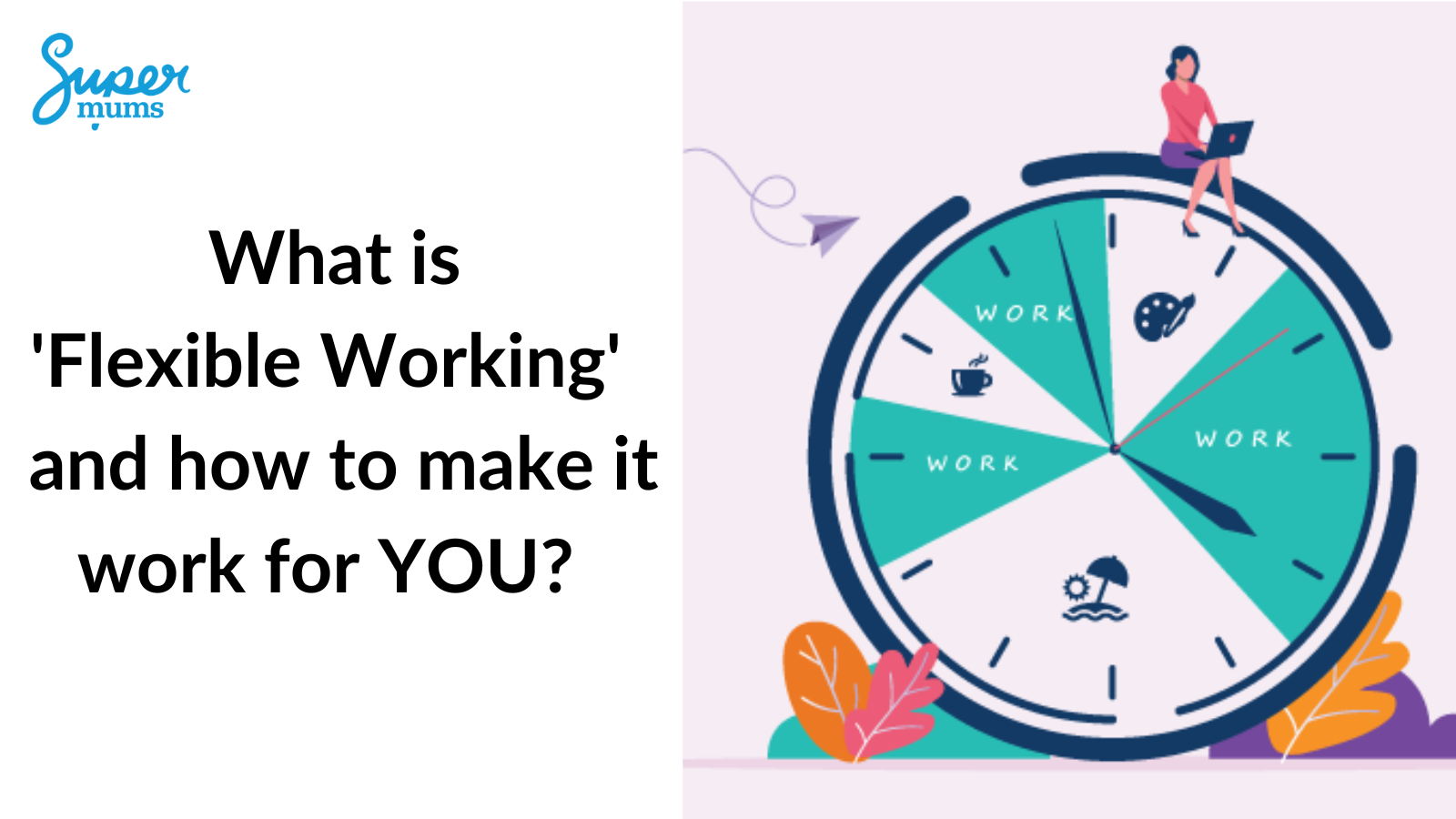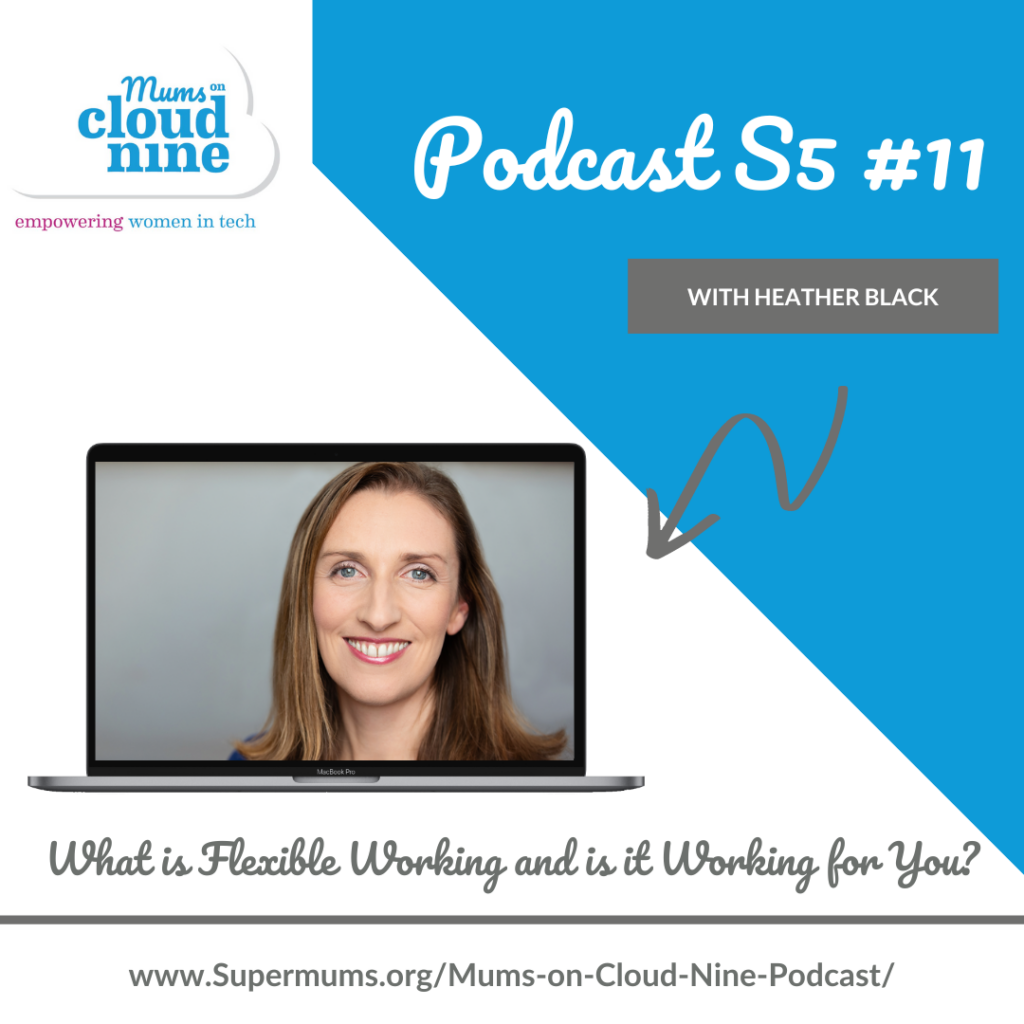What is ‘Flexible Working’ and is it Working For You?
By Jennifer Wood

Many mothers strive for flexible working practices – but what does flexible working really mean and does it enable them to have life they want and need?
In our latest podcast episode, we’re talking about the notion of flexible working and whether flexibility is currently working for you.

The Pursuit of a Better Way!
In the wake of the pandemic we have seen the Great Resignation, where people are re-assessing what they want from work with a desire to have more flexibility – Arianna Huffington recently did a poll on Linked In asking if people were rethinking their job choices and out of 62,700 respondents – 55% were job searching or had just quit in pursuit of something better.
Many mothers look for flexibility as they want to support their kids through school and manage related household and childcare responsibilities as well as look after their own health and well-being – for example, they want to to support and attend school or extra curricular events, do the drop offs and pick ups, put the kids to bed, go for a work-out or get creative….this might mean working staggered or part-time hours throughout the week to juggle work and life goals.
For example, I wanted to learn horse riding but I could only do this during working hours, so I did it at 11am each Tuesday and worked later in the evening. I wanted to watch my kids in sports matches on a Thursday afternoon, so I worked extra hours on a Saturday to play catch-up. The reality is that many women have previously felt they have to compromise to get flexibility because they thought:
- That they would have to work in a lower skilled job if they wanted a part-time or remote role.
- That companies are doing them a favour and they should accept a lower pay, or work harder in appreciation
- That well paid roles would demand more of their time and wouldn’t really honour flexibility.
This isn’t and shouldn’t need to the be case. Women should be able to thrive at work and in life if they want to progress their career. There doesn’t need to be a 9-5 rule-book but there does need to be an agreed flexible working plan.
Good employers focus on outcomes, not on hours, but it’s important to make sure that you are clear when you state the benefit to the team and to the business as well as yourself if you want more flexibility, or if you want to amend a flexible working agreement you already have.
What are the Types of Flexible Working Polices Women now Want?
Many employers I’ve spoken to immediately assume mothers want ‘part-time’ but that’s not often the case. We did three polls amongst the Flexible Working People Group hosted by Katy Fridman and here were the results to give us a flavour.
What did flexibility mean to them? In order of priority it was…
- ‘Remote working’
- ‘Remote and Flexible hours ’
- ‘Flexible hours’
- ‘Hybrid working’
- Part-Time Hours
For those seeking flexibility, we asked more about their earning aspirations and it was good to see that their belief is changing…
- 49% – Wanted to to earn the same and work remotely
- 25% – Wanted to earn the same or more
- 16% – Wanted to earn the same, but to have the flexibility in working pattern
- 6% – Wanted more career progression to earn more
- 3% – Wanted to work fewer hours and earn less.
We also did a poll on people’s thoughts about the 4 day working week and whether it would work for them. Interestingly 75% said they would like to work in this way, but the remainder would prefer some level of flexibility over 5 or more days to deliver their work so they can juggle other responsibilities during the week.
We are pleased to say the world is changing to support this agenda – employers are now having too and are choosing to offer more flexibility post pandemic to attract and retain employees, whilst mothers are realising they can still have a career and earn more working flexibly, so they are deciding whether to stay or go.
There are some magic ingredients to getting this right for both sides.. as designing a flexible working policy has to be right for both sides. It is worth undertaking some consultation work with existing staff and considering the flexibility you have within this policy to make it indeed ‘flexible’ for different people. Welcome to the new world. So what are the types of flexible working that employees could request and companies could offer?
What is Flexible Working and is it working for YOU?
Two people do one job and split the hours. Job share companies such as Ginibee and The Job Share Project offer lots of advice on finding a job share partner, and the benefit to the employer is huge if they have a big job to handle and the job share partners can cross over on one of your days.
Working from Home / Remotely
It might be possible to do some or all of the work from home or anywhere else other than the normal place of work allowing for time for family and wellbeing.
Part-Time
Working less than full-time hours (usually by working fewer days).
Compressed Hours
Working full-time hours but over fewer days.
Flexitime
The employee chooses when to start and end work (within agreed limits) but works certain ‘core hours’, for example 10am to 4pm every day.
Annualised Hours
The employee has to work a certain number of hours over the year but they have some flexibility about when they work. There are sometimes ‘core hours’ which the employee regularly works each week, and they work the rest of their hours flexibly or when there’s extra demand at work.
Staggered Hours
The employee has different start, finish and break times from other workers.
Phased Retirement
Default retirement age has been phased out and older workers can choose when they want to retire. This means they can reduce their hours and work part time.
Post Pandemic we are seeing Salesforce Consultancies and Companies competing for talent based on flexible work benefits alongside pay. Corporate companies who traditionally believed in on-site work 5 days a week are now offering fully remote, part-time, staggered hour working practices for new staff, in some cases it has been seasonal contracted time or unlimited holiday if outcomes are achieved. We are seeing companies offer job shares and provide training opportunities to be more attractive where salaries can’t be be lifted.
They want to support people to go to the gym or pick up kids in the day and they can work remotely, part time or make up their hours in the evening – this was never a possibility before!
All these are great options in principle, but if mothers request and adopt flexible working practices, does it really result in the desired outcomes and what are the risks of it not working out? Here are 5 scenarios:
Scenario No 1 – Working remotely from home could mean you end up working more hours. as you don’t have the boundaries of ‘working in the office’ and leaving the office.
A recent poll hosted on LinkedIn by Chelyn Briand posed the question ‘Are you now working more or fewer hours’ working remotely’. Out of 205 responses.. 61% claimed that they worked more hours ..with only 29% saying the same and 10% saying fewer! Uh Oh! Is that really wanted they hoped? Are they doing this because they can’t manage their boundaries between work and life.. We can be ‘contracted’ to work a certain number of hours but do we manage our boundries..do we need to turn off notifications, close down the work phone or laptop, do we need to schedule events so we have to leave the house and not get stuck at our desk.
Scenario No 2 – Being contracted part-time means you could still be working over your hours to get work done but you are still getting paid for part-time hours.
What are the reasons for this? – Are you not performing as well as you could be? Have you not reduced your tasks to align to reduced hours? Are people expecting you to get stuff done in an unreasonable time period? – assess assess assess.. I’m intrigued by the 4 day working week experiment in the UK and to see the pending results.. as it’s based on the principle of fulfilling your existing 5 day workload within a reduced 32hrs with one day off a week.
Scenario No 3 – Are you one of those people that always says ‘yes’ or feels guilty?
You don’t want to let people down. You have a never ending to do list, deadlines are not realistic, you feel responsible to get things done? Is it about improving time management and planning? Is it about self-management and holding one self accountable to not over commit and to push back on colleagues if needed?
Scenario No 4 – Working remotely could result in a feeling of isolation or exclusion.
If the company hasn’t addressed an inclusive working culture that supports hybrid working practices and there is a perceived risk that remote workers may get overlooked for promotion or team events.
Scenario No 5 – If parents work full time / 5 days a week this can be very demanding on their life.
How can they manage all of the related responsibilities? This can lead out to burn out and survival mode if they don’t get the right support network and mindset in place.
For women, self management, self belief and self leadership are key to achieving true flexible working and to tackle these risks, alongside working with employers that support a flexible working culture. Being in your power to manage your boundaries, to plan your time, to maintain your commitments will help you achieve your goals as a mother. At Supermums we are tackling this agenda in two ways:
- For employers we are running our #LevellingUpWomen Campaign to help them out in place policies to attract, support and retain women.
- For people wanting flexibility we are upskilling them in Salesforce skills and coaching skills to achieve their personal and professional goals. Why not sign up to our FREE career challenge and listen to our upcoming #ParentsFlexUp podcasts, as part of the Mums on Cloud Nine series.

Recent Posts
Written By:
Subscribe To Our Weekly Top Tip Bulletin
Get Updates And Learn From The Best









